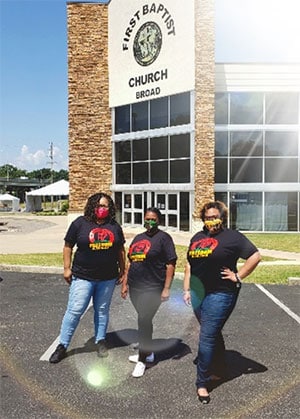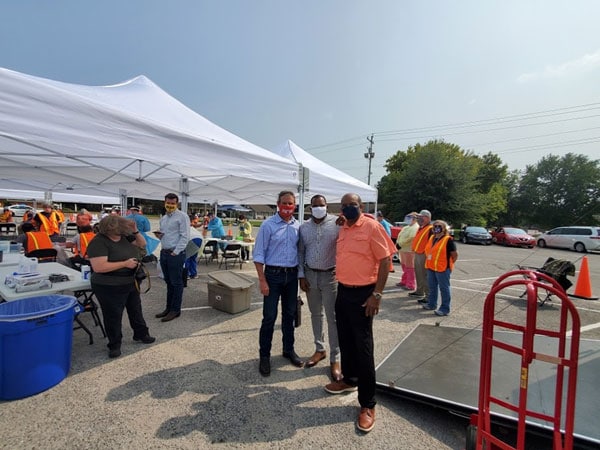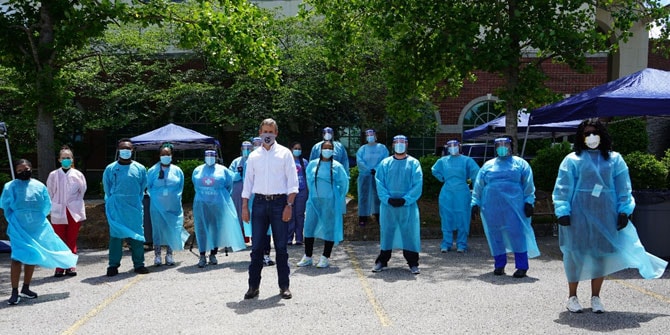Tennessee COVID-19 Health Disparity Task Force Builds Trust to Battle Misinformation

(left to right) Monique Anthony, director of the Office of Minority Health; Kimberly Lamar, PhD, assistant commissioner of Division of Health Disparities Elimination; and Elizabeth Hart, director of the Office of Faith-Based and Community Engagement, led a special Juneteenth COVID-19 testing event at multiple locations in Memphis, Tennessee, including First Baptist Church-Broad.
Community engagement through mobilization
In Tennessee, 17% of the population are African American; however, in the spring of 2020, 20% of COVID-19 cases and 33% of deaths in the states were among Black or African American persons. Recognizing the disproportionate impact COVID-19 had on people from racial and ethnic minority groups, the Office of Minority Health within Tennessee Department of Health’s Division of Disparities Elimination (DHDE) convened the COVID-19 Health Disparity Task Force, a group of more than 800 partners across the state. The Health Disparity Task Force aimed to address disparities by improving the efficiency and effectiveness of disseminating information to communities they serve. The Task Force includes community and faith-based partners, members of academia, healthcare providers, and public health officials. The group meets weekly to discuss trends, hear from subject matter experts, identify sources of distrust, and address concerns from under-resourced communities.
Through hosting listening sessions and town halls for community partners and Task Force members, the DHDE team learned that no matter which group they engaged, they all had questions and concerns about the vaccine. The DHDE team knew it would be too late to gain trust if they waited to engage and share information with communities until a vaccine was developed.
“There was a lot of misinformation we had to talk through, beginning with testing and eventually vaccination,” said Dr. Kimberly Lamar, assistant commissioner of Division of Disparities Elimination. Dr. Lamar advocates for the interests of people from racial and ethnic minority groups within the governor’s unified command group by elevating community perspectives and Health Disparity Task Force concerns to the highest levels of state government. Together, their efforts led to more testing and vaccination events among people from various racial and ethnic minority groups. They also enticed the governor to take on an active, supportive role by visiting some of them to stay connected to what is happening on the ground.
Delivering information to the people who need it
The diverse 800-member Health Disparity Task Force is a key vehicle of DHDE to mobilize the delivery of credible information and vaccines directly to community members.
Monique Anthony, director of the Office of Minority Health, said “Partnering with academic institutions such as Historically Black Colleges and Universities has helped us develop strategies to increase vaccine uptake in the surrounding communities and amplify vaccine confidence.”
To increase vaccine trust and accessibility in communities disproportionately impacted by COVID-19, the team strengthened connections with small business owners, faith leaders, academia, Federally Qualified Health Centers, and other key partners to share vaccine information through as many modes as possible. Their office has committed substantial resources towards outreach and engagement activities to reach people where they are most active in their communities.
“Because we were already in these communities, it was easier to go in and work with our faith leaders to host vaccination events,” said Francis Garcia, Hispanic Outreach and Engagement Coordinator in the Office of Minority Health. Garcia and his team traveled from Memphis to Knoxville, and spent hours working faith leaders with religious minority groups of all sizes to organize vaccine events, coordinate interpreter services, and share translated vaccine information in several languages including Spanish, Somali, and Kurdish.
The Task Force includes faith leaders from different traditions and denominations from across the state. They worked with the Office of Minority Health to identify people in their communities who wanted to get vaccinated but were having trouble navigating the internet and social media.
According to Dr. Lamar, it is all about transparency and connecting with people where they are. “Making sure the community understands we are here for them and not just waiting for them to come to us if they need us,” she said. “Social media couldn’t be the only avenue. There are large pockets of our community that have limited access from those channels. We had to create ways to come directly to them, taking services out of the four walls of the health department and into the community.”
Creating responsive solutions
The vision of DHDE is to address health disparities and health equity through meaningful collaboration and engagement. The team understands the importance of communities hearing messages from people who look like them. The Our Voices Campaignexternal icon was launched on June 15, 2021, to elevate the voices of people from racial and ethnic groups by helping them share personal stories of how the COVID-19 pandemic affected their lives and their communities.
Faith leaders on the Task Force continue to host clinics at their places of worship and make sure members of their congregations know where the closest vaccination clinics are. When they hear members of their communities say something that isn’t accurate, they help direct them to trusted sources of information to empower their community to protect themselves from misinformation.
Moving forward, DHDE plans to ensure partners and Task Force members receive more support and funding to address COVID-19 health inequitiesexternal icon. “It’s not even about the short game of COVID-19, but you’ve got to talk about the long game of health disparities,” according to Elizabeth Hart, director of the Office of Faith-based and Community Engagement. “Let’s address the reasons people from some ethnic and minority groups were affected by COVID-19 as much they were.”
What are you, your health department, or your organization doing to support COVID-19 vaccination in your community? Share your story with communityfeatures@cdc.gov and you could see it on our COVID-19 Vaccine Community Features page.

